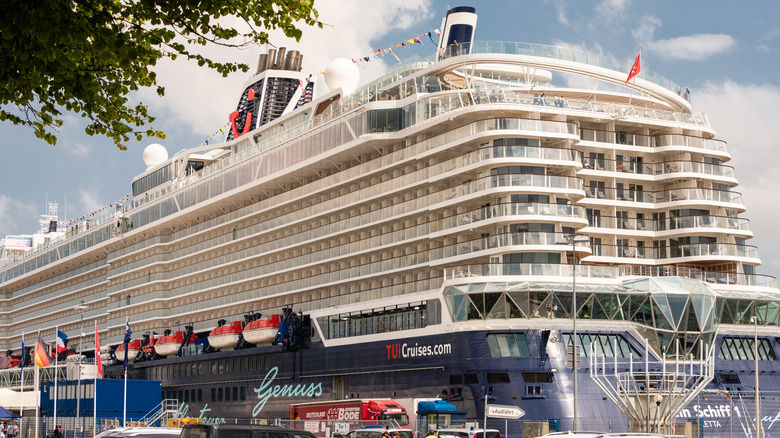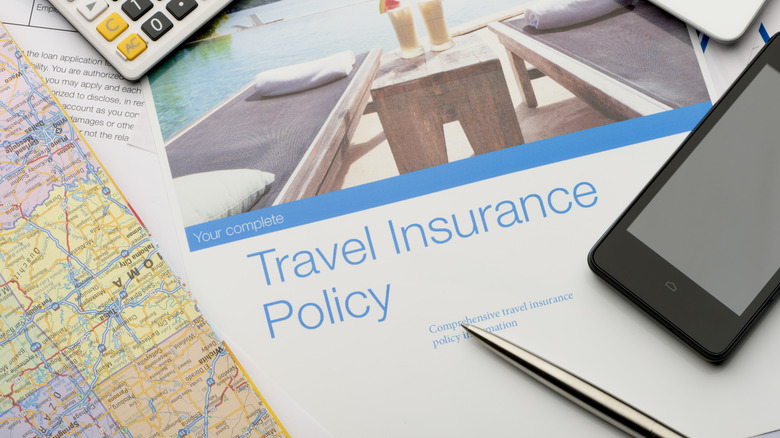What To Expect If Your Cruise Ship Changes The Planned Itinerary
With most cruise lines releasing itineraries and selling tickets up to two years in advance, you'd think that nothing could derail your meticulously planned vacation. You naturally expect everything to go smoothly, but in reality, much like flights, cruises can get canceled, delayed, or rerouted before departure or even mid-trip. And, unfortunately, you might not be entitled to compensation.
In December 2023, for instance, a cruise ship bound for the Bahamas had to divert to ports in New England and Canada "due to unseasonable and rapidly worsening weather," per a statement shared via ABC News. Similarly, in February 2024, The Washington Post reported that the Norwegian Star had to skip the mainland of Antarctica, citing the need to "optimize the itinerary or to accommodate certain circumstances" as well as to comply with a "recent regulatory requirement in the area."
These disruptions, while uncommon, do happen. If you booked a cruise that faced an itinerary change, your recourse depends on the text buried in the company's terms and conditions. For example, Norwegian's policy doesn't require refunds if things go south. Its terms and conditions state, "In the event of strikes, lockouts, stoppages of labor, riots, weather conditions, mechanical difficulties or any other reason whatsoever, Norwegian Cruise Line has the right to cancel, advance, postpone or substitute any scheduled sailing or itinerary without prior notice." So, despite some passengers feeling scammed, they technically agreed to this clause when they booked their trip.
Travel insurance may provide compensation
Just because the contract doesn't obligate them to provide compensation doesn't mean cruise lines won't, so don't use this as reason to avoid taking a cruise. Travel expert Anne Sutherland told Express UK that occasionally cruise lines throw passengers a bone as a gesture of good faith. "Some cruise lines might offer compensation in the form of onboard credits, discounts on future cruises, or even partial refunds. Or if a port is skipped, the cruise line might arrange for an alternative port or offer additional onboard activities," she explained, although she described these instances as "rare." She added, "Investing in travel insurance that covers itinerary changes can offer passengers peace of mind and potential compensation."
When shopping for travel insurance, don't skip the fine print; you don't want to get caught off guard when you need to cash in on that compensation. For an added layer of security, consider cancel for any reason (CFAR) insurance, which could help you get back a significant chunk of your investment if the cruise line changes something and you decide to bail. The catch? It costs about 3% of your trip but could potentially reimburse you 50% or 75% of your expenses if you cancel within a reasonable timeframe (insurance companies usually require 48 hours). It's pricey, sure, but peace of mind isn't cheap.
Plan ahead to take some of the sting out of itinerary changes
Beyond purchasing travel insurance, you can take a few additional steps to help lessen your losses in the event of an itinerary change. First, consider booking your cruise with a credit card. Many credit cards have built-in travel protection, so if you don't receive compensation through your dedicated travel insurance, you might have a shot at coverage depending on your card's policy. Again, read the fine print to determine what it does and does not cover. Remember: credit cards don't tend to offer robust travel protection compared to actual travel insurance, so keep your expectations in check.
Consider enlisting a travel agent for all things cruise-related to help you navigate these headaches, too. They can break down a cruise's policy for you and suggest alternatives when your cruise suddenly doesn't match your dream itinerary. "It means you'll also have someone who can adjust other travel arrangements beyond the cruise itself," Joel Katz, Australasia managing director of Cruise Lines International Association (CLIA), told Escape.
Additionally, you might want to avoid booking your trip during periods when cruises are the most likely to change or cancel their itineraries. For example, hurricane season is the one time of the year you may not want to visit the Caribbean. And if you have Santorini on your list, beware of those high Meltemi winds between July and September. As always, a little research goes a long way.


